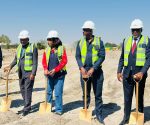Namibia is turning its attention to the small but rapidly growing South American nation of Guyana as it seeks to develop its own burgeoning oil and gas sector. Following significant offshore discoveries in recent years and under the leadership of a new government, Namibia is keen to learn from Guyana’s successes and challenges in managing its hydrocarbon resources. Namibia is particularly interested in how Guyana has structured its regulatory framework, managed revenue inflows, and ensured that oil wealth translates into tangible benefits for its citizens.
In a recent exclusive interview with OilNOW, Kornelia Shilunga, Special Advisor on Oil and Gas to Namibia’s President, revealed that a high-level delegation had undertaken a benchmarking visit to Guyana to study its oil and gas governance model. “The President, Her Excellency Dr. Netumbo Nandi-Ndaitwah, feels we need to put up a structure, and also to put up a legal framework that will govern that structure for us to be able to manage our oil and gas sector,” Shilunga explained. This move underscores Namibia’s commitment to establishing a robust and transparent system before full-scale production begins, ensuring that the sector’s development aligns with national priorities.
The Namibian delegation engaged with key Guyanese officials, including the Minister of Natural Resources and the Minister of Finance, to gain insights into revenue management, local content policies, and broader economic transformation strategies. “We were learning more on how revenue is accrued, how it is managed, how it is benefiting the Guyanese, and how it translates to transformational development in the country,” Shilunga noted. These discussions were particularly valuable for Namibia, which is still in the early stages of structuring its oil and gas governance mechanisms.
One of the critical areas of focus for Namibia is local content—a policy framework designed to ensure that Namibian businesses and workers benefit from the oil and gas sector. Shilunga confirmed that Namibia has already approved a local content policy, which has undergone extensive review processes and received Cabinet approval. “What is left for us to do now is just to take it to the different regions of Namibia to explain to the Namibian people,” she said. This step is crucial in fostering public understanding and support, as the government seeks to ensure that the sector’s growth translates into job creation and skills development for local communities.
Another key area of interest for Namibia is the management of oil revenues through a sovereign wealth fund (SWF). While Namibia already has an SWF in place, the government is keen to refine its approach by learning from Guyana’s experiences. Guyana’s Natural Resource Fund, established to manage oil revenues transparently and sustainably, has been a focal point for Namibian officials. Shilunga emphasized that Namibia intends to adopt best practices to ensure that its SWF not only preserves wealth for future generations but also supports immediate socio-economic development.
The relationship between Namibia and Guyana extends beyond oil and gas, with the two nations sharing long-standing diplomatic ties. These historical connections provide a strong foundation for technical cooperation in the energy sector. “When it comes to oil and gas, we are just going to build on the foundation that was created already by our forefathers and by the leaders that have led Namibia and Guyana,” Shilunga said. She also highlighted previous engagements, including a visit by Namibia’s former Minister of Mines and Energy last year, which laid the groundwork for the current collaboration.
Namibia’s interest in Guyana’s model comes at a pivotal moment for both countries. Since ExxonMobil’s first major discovery in Guyana’s Stabroek Block in 2015, the country has emerged as one of the world’s fastest-growing oil producers, with reserves exceeding 11 billion barrels of oil equivalent. This rapid development has brought both opportunities and challenges, particularly in terms of ensuring that oil revenues drive broad-based economic growth rather than exacerbating inequality or environmental risks. Namibia, which is still in the exploration phase, is keen to avoid some of the pitfalls experienced by other resource-rich nations by implementing strong governance structures from the outset.
For Namibia, the oil and gas sector represents more than just an economic opportunity—it is seen as a catalyst for national transformation. President Nandi-Ndaitwah’s administration has placed a strong emphasis on job creation, particularly for the youth, with an ambitious target of generating 500,000 new jobs. The government’s broader development plan includes vocational training programs, expansion of public health and education services, and investments in agriculture and creative industries. The oil sector is expected to play a central role in financing these initiatives, provided that revenues are managed effectively.
The recent discoveries by Shell and TotalEnergies in Namibia’s Orange Basin in 2022 have positioned the country as one of the most promising new exploration hotspots in the world. These finds have drawn comparisons to Guyana’s own rapid ascent in the global oil market, prompting a surge of interest from international energy companies. With major players rushing to secure exploration rights, Namibia is under pressure to finalize its regulatory framework to ensure that the sector develops in a way that maximizes national benefits.
As Namibia moves forward, the lessons from Guyana will be invaluable. Guyana’s experience highlights the importance of strong institutions, transparent revenue management, and a clear local content strategy to ensure that oil wealth benefits the broader population. For Namibia, the challenge will be to adapt these lessons to its unique context, balancing rapid sector growth with long-term sustainability.
The collaboration between the two nations marks an important step in South-South cooperation, where developing countries share knowledge and expertise to navigate the complexities of resource management. As Namibia continues to refine its policies and prepare for the next phase of its oil and gas journey, the insights gained from Guyana will play a crucial role in shaping a sector that could transform the country’s economic future. With careful planning and strong governance, Namibia has the potential to avoid the so-called “resource curse” and instead use its hydrocarbon wealth as a springboard for inclusive and sustainable development.










